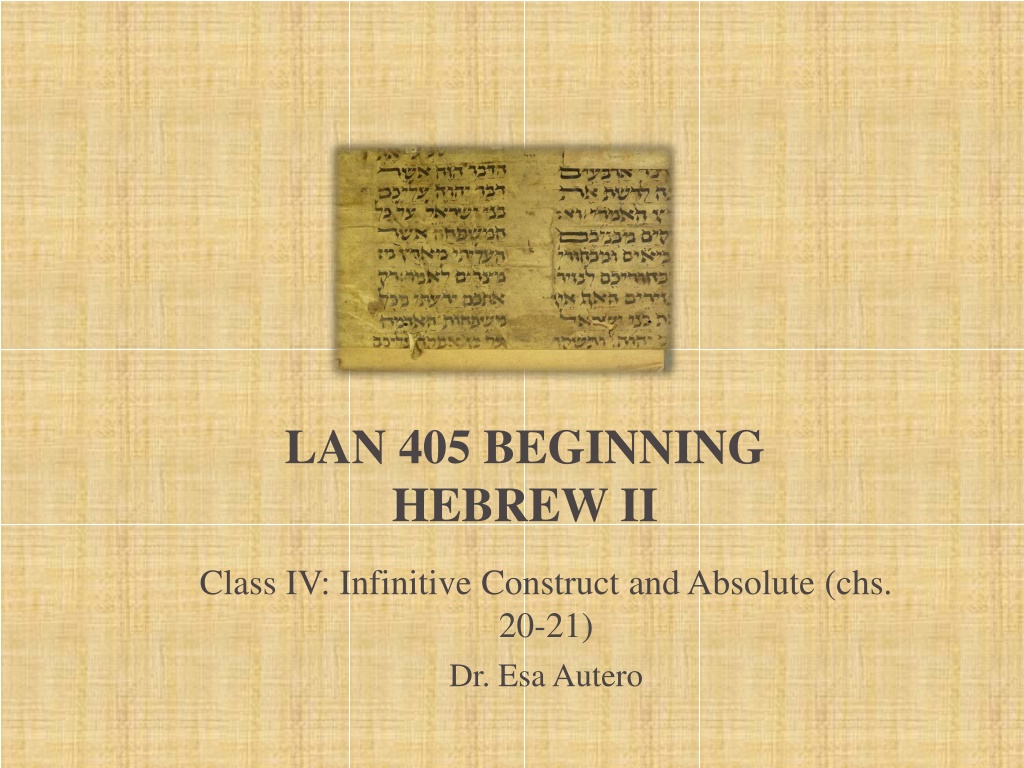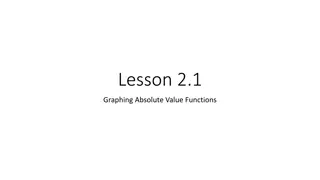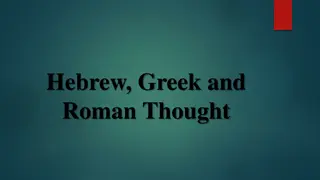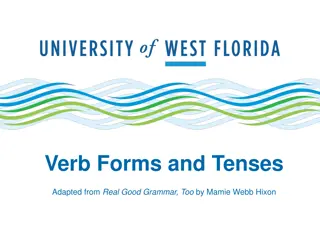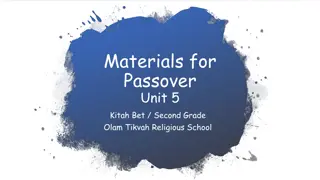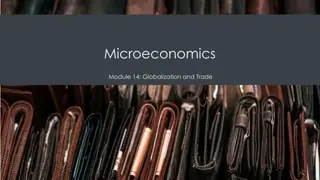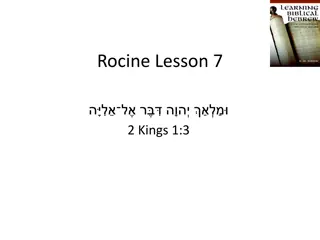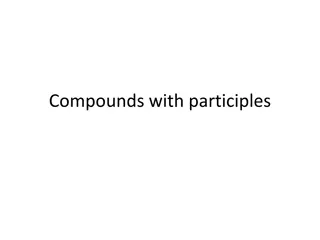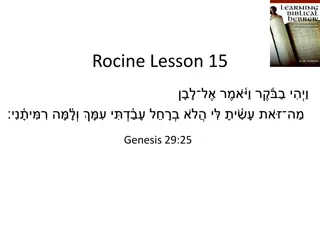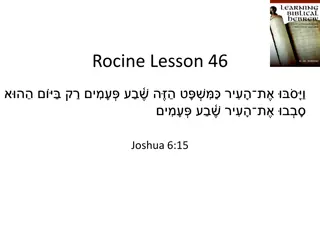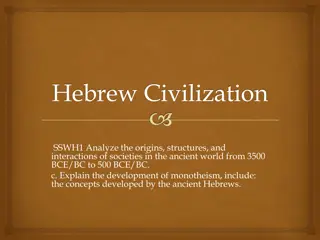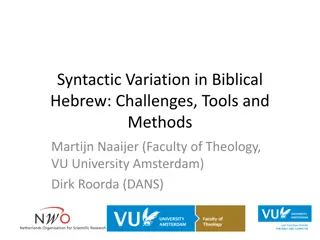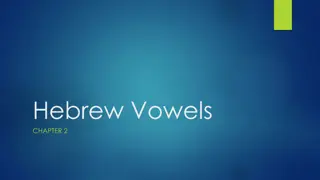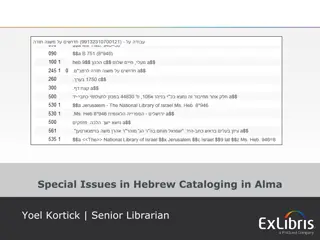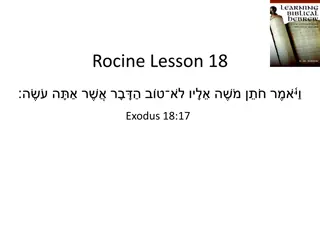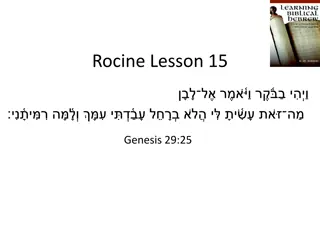Exploring Hebrew Infinitive Construct and Absolute Forms
Explore the characteristics and forms of infinitive constructs and absolutes in Hebrew, understanding their similarities and differences to English infinitives. Delve into the identification and translations of infinitive construct forms, along with examples of verbal roots in infinitive construct form. Gain insights into the variations and patterns of infinitive construct verbs in Hebrew.
Download Presentation

Please find below an Image/Link to download the presentation.
The content on the website is provided AS IS for your information and personal use only. It may not be sold, licensed, or shared on other websites without obtaining consent from the author. Download presentation by click this link. If you encounter any issues during the download, it is possible that the publisher has removed the file from their server.
E N D
Presentation Transcript
LAN 405 BEGINNING HEBREW II Class IV: Infinitive Construct and Absolute (chs. 20-21) Dr. Esa Autero
Infinitive Construct and Absolute 1.1 Introduction Infinitive is a verbal noun Characteristics of both verb and noun English infinitive: to +verb to study, to see etc. Two types of infinitives in Hebrew Infinitive Construct similar to Engl. Infinitive Absolute no English equivalent
Infinitive Construct and Absolute 2.1 Infinitive Construct Infinitive Construct Form No person, gender, or case to memorize Vowels remain considerably stable in all forms Identical to Qal imperative 2ms (also ) Two possible identifications for (Qal inf. csnt. OR Qal imp. 2ms) Context as the key to identification
Infinitive Construct and Absolute Imp. 2ms Inf. cnst. Translation To write, writing A-class stem vowel not retained in inf.cstr. as in the imp. Strong Strong To remember, remembering To abandon, abandoning I-Gutt Note the Furtive pathach the stem remains holem To say, saying I- II-Gutt To choose, choosing To send, sending III- To hear, hearing III- To call, calling III-
Infinitive Construct and Absolute III- inf. const. ends in Summary of III- Verbal Endings Ending Example Translation Impf. He will build Regular impf. ends in Imp. You (2ms) build! inf ctr. To build, building Imperative ends in
Infinitive Construct and Absolute Verbal root Inf. cstr. Translation To build, building To weep, weeping To go up, going up To answer, answering To do, doing to be, being To see, seeing
Infinitive Construct and Absolute I- Infinitive Construct Verb. root Inf. cstr. Alternate (/ Retaining Alternate form - is lost is added )
Infinitive Construct and Absolute I- Infinitive Construct Verb. root Inf. cstr. Most, not all, I- verbs drop the initial yod add final Vowel pattern similar to Segholate nouns
Infinitive Construct and Absolute Biconsonantal Infinitive Construct Imperative 2ms and infinitive construct forms are identical Verb. root Inf. cstr. Context clarifies which one in most cases Parsing infinitives Qal. Inf. construct
Infinitive Construct and Absolute Suf. PNG Suffix (sub.) My killing Suffix (obj.) Killing me Infinitive construct with pronominal suffixes 1cs 2ms your killing Killing you Frequent occurrence 2fs your killing killing you Suffixes as object or subject of the verbal idea 3ms his killing Killing him 3fs her killing Killing her Vowel changes 1cp our killing Killing us Qamets Hatuf as diagnostic indicator 2mp your killing Killing you 2fp your killing Killing you 3mp Their killing killing them 3fp Their killing killing them
Infinitive Construct and Absolute Infinitive construct with inseparable prepositions , , may be prefixed to infinitive construct Translational value Infinitive construct + purpose or result in order to remember Infinitive construct + and temporal meaning (time) or - when/while observing
Infinitive Construct and Absolute Infinitive construct is the only verbal form that takes inseparable preposition Infinitive construct can also be prefixed with preposition AND pronominal suffix while he was hearing/while hearing him Negation of the infinitive construct not used with infinitive and Infinitive negated with not or in order not Two forms with identical meaning: and and in order not to kill
Infinitive Construct and Absolute 2.2 The use of infinitive construct The most difficult Hb. conjugation to translate Inseparable prepositions, suffixes, and variety of translational values Some of the most common uses: 1) Purpose, intention, or result When prefixed with purpose, intent, result ( to , in order to ) And he took the knife (in order) to slaughter his son (Gen 22:10) And they sat down (in order) to eat bread (Gen 37:25)
Infinitive Construct and Absolute 2) Inceptive Infinitive cstr. prefixed with may denote action about to take place Often connected to (to be) +inf. cstr. with Translate about to The sun was about to set (Gen 15:12)
Infinitive Construct and Absolute 3) Verbal noun Inf. cstr. functions like a noun subject or object of verbal idea May or may not have Behold, to obey (obeying) is better than sacrifice (1 Sam 15:22) 4) Complementary Inf. cstr. explain, clarify, complement preceding action or idea May or may not have ---- translate with by plus -ing And you shall observe the commandments of the LORD your God by walking in His ways (Deut 8:6)
Infinitive Construct and Absolute 5) Temporal prefixed with or Temporal clause translated as when or while Time value needs to be deduced from the context (past, present, future) - when he heard or when he hears/will hear complete or incomplete action and when he heard and when he hears/will hear Temporal modifiers provide a clue to aspect signals past tense narration signals future tense narration Good, though not the only, clues to the translation of inf. cstr.
Infinitive Construct and Absolute When (while) Israel dwelt in that land (Gen 35:22) When they were in the field (Gen 4:8) And when you pass (have passed) over the Jordan, you shall set up these stones (Deut 27:4)
Infinitive Construct and Absolute Practice Workbook p. 163, no: 2-6 Parsing on p. 165, no: 1-5 Homework: See slide no: 29
Infinitive Construct and Absolute 3.1 Infinitive Absolute Less frequent and easier than Infinitive construct Only 872 times in HB.* No precise equivalent in English for infinitive absolute Only one form to memorize Same vowel pattern in most strong and weak verbs Inf. Abs. does not occur with prepositions Holem waw of ten written defectively as Don t confuse the alternate form of inf. abs. ( ) with impr. 2ms or inf. str. forms ( ) Qamets under the first root consonant diagnostic marker
Infinitive Construct and Absolute Q.pf. 3ms Inf. abs. I-Gutt Notice furtive pathach in , / ) - verbs) I- II- Gutt See also III- verbs III- Verbal root Infinitive absolute III- / / / / III- I- I- Gemt.
Infinitive Construct and Absolute Inf. abs. & biconsonantal verbs Holem waw in every verbs Verbal root Infinitive absolute Note the similarity b/w inf. abs. of and inf. cstr. form of ( ) / Parsing infinitive absolute Qal. inf. abs. Qal. inf. abs.
Infinitive Construct and Absolute 3.2 The use of infinitive absolute No precise English equivalent to Hb. inf. cstr. Usually used to Emphasize or intensify verbal intensity In place of imperative to express a command With other verbs to express simultaneous action of two verbs
Infinitive Construct and Absolute 1) Emphatic use of infinitive absolute Inf. abs. usually precedes (or rarely follows) pf. or impf. verb to emphasize verbal meaning You (2mp) will indeed listen (Ex 19:5) You (2ms) will certainly die (2 Kgs 1:16) Know for certain that you (2ms) will surely die (1 Kgs 2:37)
Infinitive Construct and Absolute 2) Imperatival Inf. abs. can stand by itself and function as an imperative Remember this day! (Ex 13:3) Observe the Sabbath day! (Deut 5:12)
Infinitive Construct and Absolute 3) Contemporaneous Action Two infinitive absolutes used together with pf. or impf. verb to express two verbal actions occurring at the same time (literally) and he walked, walking and eating (better English) and he walked, eating as he went (Judg 14:9) (literally) and they went up, going up and weeping (better Eng.) and they went up, weeping as they went (2 Sam 15:30)
Infinitive Construct and Absolute 4) Complementary Inf. abs may complement the main verb of a sentence and carry the temporal value of that maim verb translate like pf. or impf. verb All of the congregation shall stone him with stones (Num 15:35) He set him over the land of Egypt (Gen 41:43)
Infinitive Construct and Absolute 3.3 The particles and The existence of something in Hb. is expressed with (also ) Translated as there is/there are not spelling changes or paradigms there is a king or a kings is There are kings or kings are 28:16) Surely the LORD is in this place (Gen Also expresses possession with the preposition (to) there is to me hope I have hope (Ruth 1:12) is there to you a brother do you have a brother? (Gen 43:7)
Infinitive Construct and Absolute The non-existence of something is expressed with Translate as there is not/there are not Joseph was not in the cistern (Gen 37:29) And there is no knowledge of God in the land (Hos 4:1) Sometimes occurs with pronominal suffixes or negate a verbless clause They don t fear the LORD (2 Kgs 17:34) The fool says in his heart, There is no God (Ps 53:2) (also )
Infinitive Construct and Absolute Practice Workbook p. 173, no: 1-5 p. 174, no: 1-5 Homework Workbook: Bible Translation , p. 167, no: 1-3; p. 175, no: 1-3. [Quizz IV on vocabularies, chs. 20-21 (20.14 [p. 249] & 21.9 [pp. 256-257])] EXAM I next week (chs. 16-20)
